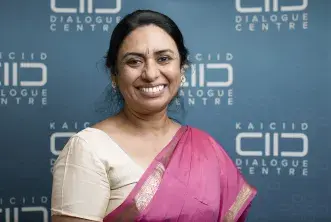For Dr. Kezevino Aram, Joy Comes from Serving the Most Vulnerable

The township of Kovaipudur has a reputation.
Located in the foothills of the Sahyadri Mountain range and part of the city of Coimbatore, in Tamil Nadu, India, the township enjoys gentle mountain breezes and monsoon rains that create a generally serene setting of lush vegetation. Locals know Kovaipudur is cooler than the rest of the city.
But Kovaipudur is also known as the home of Shanti Ashram, an international centre for development, learning and collaboration founded by Dr. M. Aram and Mrs. Minoti Aram, who are Dr. Kezevino Aram´s parents, in 1986 on the Gandhian principle of Sarvodaya (progress for all).
According to Shanti Ashram’s records, its community work impacts more than 250,000 people in Coimbatore and its environs. KAICIID BoD Member Dr. Kezevino Aram has been leading the Ashram as its President since 2014. Through her hands-on, collaborative approach, Aram has responded to numerous challenges and crises in her community— most recently the COVID-19 pandemic.
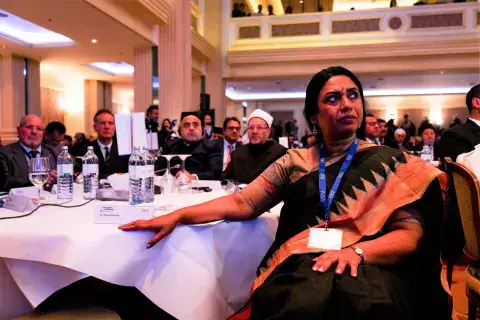
She has developed a pattern for dialogue and policy development based on convening multiple voices from various communities. With a particular focus on involving women and children, Aram has helped further establish Shanti Ashram as a centre for learning, development, and collaborative action that addresses inequalities, provides care during catastrophe, and produces leaders for future development.
“Our faith does not permit us to talk alone"
Aram first attended medical school in Coimbatore before serving as a doctor at Shanti Ashram for several years. She then pursued a master’s degree in Public Health at Harvard University, with a double major in children’s and international health.
Returning to Shanti Ashram, she has been key to the process of developing its capacities to address poverty alleviation, provide health services and leadership training, as well as support and convene interreligious dialogue. For Aram, Shanti Ashram’s founding principles and 36-year legacy continue to inspire their work today.
“We were founded on Gandhian principles and Gandhi said that our faith does not permit us to talk alone.
“It’s not enough to just speak a good word, we have to take the next step: useful action in the community,” she said, “we must find a link between what we think, what we see, and what we do together.” Aram’s father began with the idea that the Ashram could address global issues and meet the needs of vulnerable communities in Coimbatore and its surroundings.
Working in conjunction with community stakeholders, Shanti Ashram has programmes that focus on literacy, food insecurity, education, vocational training, psychological wellbeing, interreligious dialogue, and healthcare.
“The scale of these problems requires convening,” Aram said. Convening means they must be addressed as shared challenges requiring collaboration at the global, regional, and local levels, she explained.
The emphasis on convening is based on Shanti Ashram’s commitment to human interconnectedness, their belief that every human being has something to offer, and the awareness that democratic institutions have shown that working together is a proven way of making progress.
“Shanti Ashram is a place to come together for social action,” said Aram, “we can write the best policies, but we have to learn from people on the frontline — mostly women — who work at the interface between evidence and experience. “We are asked not only to think together but challenged to build upon each other’s comparative advantages. Strengths have to be multiplied and challenges responded to together,” she said.
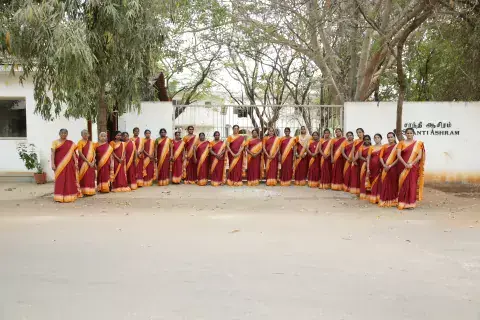
COVID 19: A once-in-a-century situation
That emphasis on working together has come into sharp focus for Aram in confronting the COVID-19 pandemic.
“We are in the midst of a once-in-a-century situation,” Aram said, “convening is helping us cope with the crisis and come out of it stronger, more resilient, but also more trusting.”
Dr. Aram and Shanti Ashram have been particularly active during the pandemic. The State government invited Aram to be part of the expert committee formed to tackle the COVID-19 pandemic at the national level. At the local level, Aram and the Ashram’s women’s health team helped organize a “Marathon for Solidarity” fundraiser, which received a 20,000 EUR donation from Pope Francis.
Through their food bank, medical facilities, and training centres for female entrepreneurs, Shanti Ashram has come to the aide of 50,000 children and their families in the villages around Coimbatore during the pandemic. Along the way, they vaccinated over 3,000 people. For Aram, this shows how vital it is to involve religious communities in every step of the policy and implementation process when responding to crises and endemic issues.
“We have to go beyond looking at religious communities as the last step,” she said. “During the pandemic, the global community recognized the religious community’s assets, its moral voice, and its contribution to composite solutions,” Aram said, “the question is if we will learn our lesson and do it more frequently and openly in the future.”
Children: a lifetime’s commitment
From the outset, Aram vowed to apply her training as a doctor to address children’s foundational needs and women’s fundamental rights.
“My core expertise is not only health,” she said, “it’s children; they are my life’s commitment.”
As KAICIID BoD Member, Aram was happy to see the Centre sign a Memorandum of Understanding with Arigatou International in July 2019, to collaborate in joint dialogue encounters and initiatives with a special focus on children and youth.
Since then, a global pandemic has highlighted just how important it is to work together to uphold and protect children’s rights and provide for their basic needs. “When the pandemic happened, it allowed me to connect various parts of my expertise, linking broader leadership needs and particular aspects of public health,” she said.
“They say ‘it takes a village to raise a child,’ but in the 21st-century, we’ve relegated the responsibility to parents alone,” she said, “in the pandemic, we are revisiting this code.”
In India, pandemic-related lockdowns adversely impacted children, preventing them from attending school or accessing basic services. “School is not just a centre for education here,” said Aram, “it’s a societal institution nurturing skill sets and knowledge to transition to adult life. “If school gets disrupted, everything gets disrupted,” she said.
With 43% of the Indian population consisting of children, this meant that almost half of the country’s population was at risk of missing critical development interventions and opportunities for growth. Undaunted, Aram used the opportunity to provide expertise in consultation with local and national governments, drawing on her shared experiences with women and children on the ground in Coimbatore.
“At the Ashram, we have integrated children and children’s voices in everything we do,” she said. For her legacy of service over the last two decades, and her critical work during the pandemic, Aram was recently awarded an Alumni Award from Harvard University´s Harvard T. H. Chan School of Public Health.
But for Aram, her joy doesn’t come from awards and recognition. It comes from serving the most vulnerable. “As schools closed, services were disrupted, the collective community had to step up. Shanti Ashram found the time to address these issues together with women and children, with governments, with different religious communities,” said Aram.
“I could not have asked for a better template to put my expertise and experience to work.”
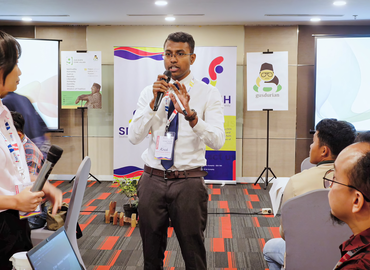
Communities suffer, not only from the echoes of broken men’…
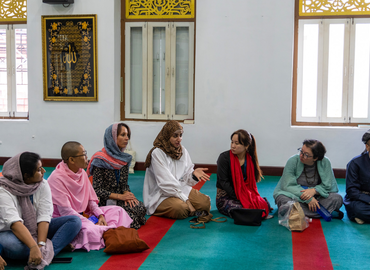
Peacebuilding today requires more than technical solutions; it demands inclusive, values-…


